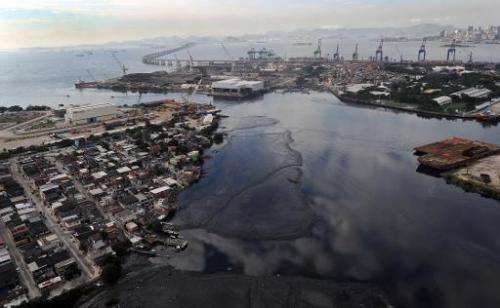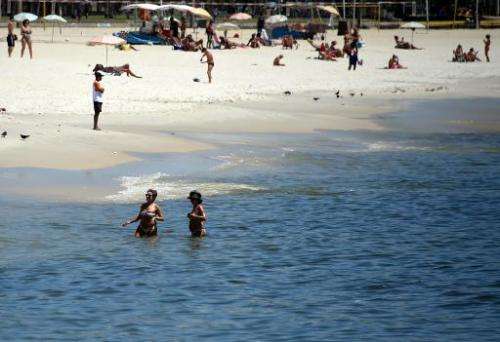Super-bacteria found in Rio bay ahead of 2016 Olympic sailing

Brazilian scientists have discovered antibiotic-resistant super-bacteria thought to emanate from hospital waste in the latest bad news for the polluted bay that will host sailing events at the 2016 Olympics.
Contact with the bacteria, which was found at three locations in a river feeding Guanabara Bay, could cause infections that require hospitalization, said microbiologist Ana Paula d'Alincourt, who led the study by the Oswaldo Cruz Institute.
So far no swimmers have been affected.
"You could get sick, but no more so than from other microorganisms. The problem is that if someone is infected, it's possible the treatment would require hospitalization and antibiotics that are no longer used because they are toxic to the body," she said.
The bacteria, which produces an enzyme resistant to standard antibiotics, was found in the Carioca River, one of the largest that runs through Rio.
One of the competition sites, Marina da Gloria, is near Flamengo Beach, where the river empties.
Nearly 70 percent of the waste of this city of 10 million people winds up in Rio's Guanabara Bay.
Thousands of liters (gallons) of untreated dirty water are dumped every day in the bay, described by one leading biologist as a "toilet."

Dead animals, television sets, sofas, shoes and other detritus have all been found in the waters, which authorities are scrambling to clean up.
A remediation plan was put in place in March ahead of the 2016 Olympics, but authorities concede they will only be able to clean up the bay by 80 percent.
An environmental 'fiasco'
"Rio de Janeiro in the 21st century has the same sanitation as in the 18th century. All the city's rivers are used as sewers" biologist Mario Moscatelli, an expert on the matter, told AFP Tuesday.
"Rio's bay is in no condition to receive the Olympics because nothing has been done. They say everything is under control but practically nothing has been done to date. The water treatment station at Flamengo is not equipped to treat hospital waste," he said.
Environmentally, Rio is "a total fiasco and the Olympic Committee is shutting its eyes to it," Moscatelli said. "There is less and less time to clean it up. They are probably going to have to make do by vaccinating the athletes."
A first Olympic sailing test in August, which drew more than 320 competitors from about 35 countries, was an eye-opener.
Australian Olympic champion Nathan Outteridge hit a dead dog with his boat. Other sailors said they had to steer clear of cat carcasses, rats and other flotsam.
The International Sailing Federation said it was "very concerned about the pollution."
Alastair Fox, the federation's chief of competitions, said that while water conditions have improved greatly since 2013 there was still much work to be done.
Contacted by AFP, the Rio-2016 organizing committee had no immediate comment on the discovery of the superbug.
Pollution in the bay is often aggravated by rains, currents and tides. The clean-up program involves the deployment of "eco barriers" to block waste from entering the bay and 10 "eco barges" to collect waste that does get through.
Rio and neighboring communities currently treat a bit more than 50 percent of the waste waters entering the bay, up from 11 percent in 2007.
© 2014 AFP


















